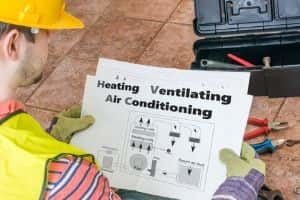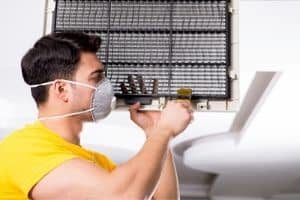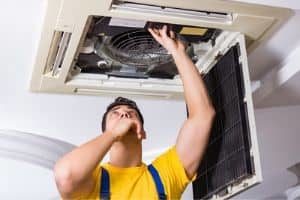
It’s almost August and that means it’s time to get your “back to school” preparations underway. Fortunately, we have some information that can also make this a season of learning for homeowners.
When is the last time you considered your heating and air conditioning system? Do you know that it is working correctly or even understand how it functions? It’s time to do some learning regarding one of the most important home fixtures.
How HVAC systems works
There are three basic types of HVAC systems:
 Forced Air Systems - Forced air systems function by using two different sets of ducts. One set forces hot air through the household when you are employing your heating system. The other forces cold air through the home when you are employing your air conditioning system. Cold air is pumped through vents in the floor or ceiling using an air conditioner and hot air is pumped in using a furnace.
Forced Air Systems - Forced air systems function by using two different sets of ducts. One set forces hot air through the household when you are employing your heating system. The other forces cold air through the home when you are employing your air conditioning system. Cold air is pumped through vents in the floor or ceiling using an air conditioner and hot air is pumped in using a furnace.- Gravity Systems - Gravity systems are usually located in the basement. They make use of the fact that hot air rises and cooler air sinks. These systems emit hot air, which rises and disperses throughout the home. When the air becomes cooler, it sinks back toward the basement. The furnace then reheats the air and then disperses it throughout the house again.
- Radiant Systems - Radiant systems work on the same principle as gravity systems. These systems heat floors, walls, and ceilings in your home. Often, heat is dispersed through a device such as a radiator. As heat emits from the radiator, it spreads and rises, heating the entire room.
All HVAC systems are controlled through a thermostat. The thermostat keeps track of the temperature in the home. When it becomes either too hot or too cold, the thermostat triggers the air conditioner or furnace to begin working accordingly.
How to Keep Your System Functioning Properly
 There are a few things you can do to maintain your HVAC system and know when it’s time to call a professional in. If you keep an eye on your system you will know when something is potentially wrong. Calling a professional early on may save you a lot of money on energy bills.
There are a few things you can do to maintain your HVAC system and know when it’s time to call a professional in. If you keep an eye on your system you will know when something is potentially wrong. Calling a professional early on may save you a lot of money on energy bills.
First, be sure to change your air filter monthly when the air conditioner is running and every six weeks when the heat is being used. You should buy modern air filters labeled for high efficiency.
Not only will changing your filter regularly keep your system running smoothly; it will also serve to ensure that toxins and allergens are not being pumped throughout your home. Next, keep debris like dirt and grass off of your air conditioner. Since the air conditioning unit is located outside, sometimes debris can inadvertently be thrown on to the unit by the lawnmower, etc.
You should clear any dirt, leaves, or grass off the unit immediately. You can inspect your own ductwork for cracks and small holes. A large portion of wasted energy can be used up by leaks in your ductwork. If you spot a hole or crack where the air is escaping, it’s time to call in an HVAC company to replace this ductwork. You can save yourself a pretty penny by performing spot checks on your own ductwork.
You should have a professional inspect your HVAC system twice a year. They can check for issues that you would not easily recognize yourself. Having a reputable company check out your system can provide for early troubleshooting and ensure that you are not wasting money on unnecessarily high energy bills.
Signs that You May Need a New System
There are several indications that may serve to let you know it is time for repairs or time to have a new HVAC system installed. These signs can include:
 Your system is more than 10 years old - If you have a system that is more than 10 years old, then you are probably spending way too much money on energy bills. Modern units are more energy efficient. Though it might cost you a good bit of money upfront, you will save money over time by having a new HVAC system installed. C
Your system is more than 10 years old - If you have a system that is more than 10 years old, then you are probably spending way too much money on energy bills. Modern units are more energy efficient. Though it might cost you a good bit of money upfront, you will save money over time by having a new HVAC system installed. C- You are still using Freon as opposed to Puron - All modern systems now run on Puron. Puron’s pressurization is higher, and it is a more efficient choice than Freon.
- Major parts failure - If you are facing the choice of having a major part, such as a compressor, motor, or coil replaced you might want to weigh the cost of the part against the cost of a new system. Parts and labor can become expensive.
- Your system is not cooling or warming your home - If your HVAC system is the improper size for your home, it will lack the ability to keep your home cool or warm.
- You are in constant need of smaller repairs - If your HVAC system is making strange noises, or if you are constantly having small repairs done, you might be better off purchasing a new system. If money is a concern, a professional can continue to bandage your unit. This may result in more money spent on the system over time, though.
Of course, if you feel your unit is unsafe, you should call a reputable repair and installation company immediately. If you are experiencing poor air quality or mold, then it is definitely time to have a new system installed.
Other signs that your HVAC system could be posing dangers are pilot light issues or the smell of gas in the air. If you have noticed any of the problems listed above, it’s time to call in the professionals. Boutwell's Air Masters can help you eliminate your problems and assist in keeping the air in your home safe.
If you think that you are in need of having your HVAC system checked or replaced call us (850) 969-9711. Boutwell's Air Masters will make sure that your HVAC system is running efficiently and safely!



